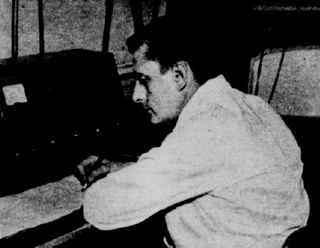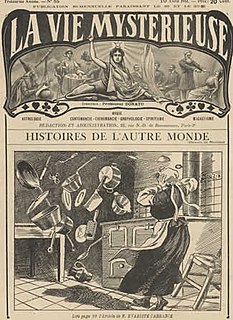
Clairvoyance is the claimed ability to gain information about an object, person, location, or physical event through extrasensory perception. Any person who is claimed to have such ability is said accordingly to be a clairvoyant.
Extrasensory perception or ESP, also called sixth sense, is a claimed paranormal ability pertaining to reception of information not gained through the recognized physical senses, but sensed with the mind. The term was adopted by Duke University psychologist J. B. Rhine to denote psychic abilities such as intuition, telepathy, psychometry, clairvoyance, and their trans-temporal operation as precognition or retrocognition.

Parapsychology is the study of alleged psychic phenomena and other paranormal claims, for example, those related to near-death experiences, synchronicity, apparitional experiences, etc. Criticized as being a pseudoscience, the majority of mainstream scientists reject it. Parapsychology has also been criticised by mainstream critics for many of its practitioners claiming that their studies are plausible in spite of there being no convincing evidence for the existence of any psychic phenomena after more than a century of research.
Parapsychology is a field of research that studies a number of ostensible paranormal phenomena, including telepathy, precognition, clairvoyance, psychokinesis, near-death experiences, reincarnation, and apparitional experiences.

The Society for Psychical Research (SPR) is a nonprofit organisation in the United Kingdom. Its stated purpose is to understand events and abilities commonly described as psychic or paranormal. It describes itself as the "first society to conduct organised scholarly research into human experiences that challenge contemporary scientific models." It does not, however, since its inception in 1882, hold any corporate opinions: SPR members assert a variety of beliefs with regard to the nature of the phenomena studied.

Telepathy is the purported vicarious transmission of information from one person's mind to another's without using any known human sensory channels or physical interaction. The term was first coined in 1882 by the classical scholar Frederic W. H. Myers, a founder of the Society for Psychical Research (SPR), and has remained more popular than the earlier expression thought-transference.

Precognition, is the psychic phenomenon of seeing, or otherwise becoming directly aware of, events in the future.

A psychic is a person who claims to use extrasensory perception (ESP) to identify information hidden from the normal senses, particularly involving telepathy or clairvoyance, or who performs acts that are apparently inexplicable by natural laws, such as psychokinesis or apportation. Although many people believe in psychic abilities, the scientific consensus is that there is no proof of the existence of such powers, and describes the practice as pseudoscience. The word "psychic" is also used as an adjective to describe such abilities.
Remote viewing (RV) is the practice of seeking impressions about a distant or unseen subject, purportedly sensing with the mind. Typically a remote viewer is expected to give information about an object, event, person or location that is hidden from physical view and separated at some distance. Physicists Russell Targ and Harold Puthoff, parapsychology researchers at Stanford Research Institute (SRI), are generally credited with coining the term "remote viewing" to distinguish it from the closely related concept of clairvoyance, although according to Targ, the term was first suggested by Ingo Swann in December 1971 during an experiment at the American Society for Psychical Research in New York City.

Ufology is the investigation of unidentified flying objects (UFOs) by people who believe that they may be of extraordinary origins. While there are instances of government, private, and fringe science investigations of UFOs, ufology is generally regarded by skeptics and science educators as a canonical example of pseudoscience.
A debunker is a person or organization that exposes or discredits claims believed to be false, exaggerated, or pretentious. The term is often associated with skeptical investigation of controversial topics such as UFOs, claimed paranormal phenomena, cryptids, conspiracy theories, alternative medicine, religion, or exploratory or fringe areas of scientific or pseudoscientific research.

Within ghost hunting and parapsychology, electronic voice phenomena (EVP) are sounds found on electronic recordings that are interpreted as spirit voices. Parapsychologist Konstantīns Raudive, who popularized the idea in the 1970s, described EVP as typically brief, usually the length of a word or short phrase.
Dean Radin is a parapsychologist. Following a bachelor and master's degree in electrical engineering and a PhD in educational psychology Radin worked at Bell Labs, researched at Princeton University, GTE Laboratories, University of Edinburgh, SRI International, Interval Research Corporation, and was a faculty member at University of Nevada, Las Vegas. Radin then became Chief Scientist at the Institute of Noetic Sciences (IONS), in Petaluma, California, USA. Radin served on dissertation committees at Saybrook Graduate School and Research Center, and was former President of the Parapsychological Association. He is also co-editor-in-chief of the journal Explore: The Journal of Science and Healing.

Christopher Charles French is a British psychologist specialising in the psychology of paranormal beliefs and experiences, cognition and emotion. He is the head of the University of London's anomalistic Psychology Research Unit and appears regularly in the media as an expert on testing paranormal claims.

Russell Targ is an American physicist, parapsychologist and author who is best known for his work on remote viewing.

Stanley Krippner is an American psychologist and parapsychologist. He received a B.S. degree from the University of Wisconsin–Madison in 1954 and M.A. (1957) and Ph.D. (1961) degrees from Northwestern University.

Ghost hunting is the process of investigating locations that are reported to be haunted by ghosts. Typically, a ghost-hunting team will attempt to collect evidence supporting the existence of paranormal activity. Ghost hunters use a variety of electronic devices, including EMF meters, digital thermometers, both handheld and static digital video cameras, including thermographic and night vision cameras, night vision goggles, as well as digital audio recorders. Other more traditional techniques are also used, such as conducting interviews and researching the history of allegedly haunted sites. Ghost hunters may also refer to themselves as "paranormal investigators."

The Society for Scientific Exploration, or SSE, is a group committed to studying fringe science. The opinions of the organization in regard to what are the proper limits of scientific exploration are often at odds with those of mainstream science. Critics argue that the SSE is devoted to disreputable ideas far outside the scientific mainstream.
In psychology, anomalistic psychology is the study of human behaviour and experience connected with what is often called the paranormal, with few assumptions made about the validity of the reported phenomena.

Psychokinesis, or telekinesis, is a claimed psychic ability allowing a person to influence a physical system without physical interaction.













